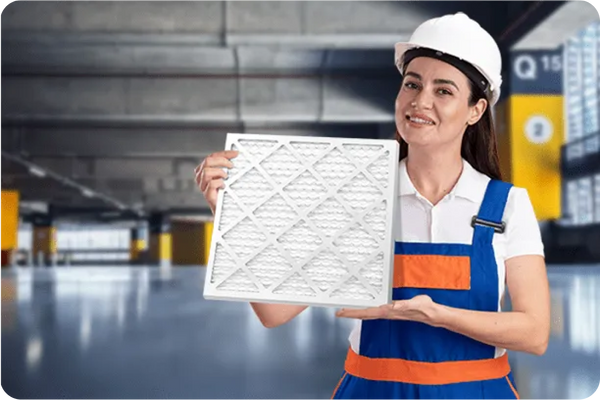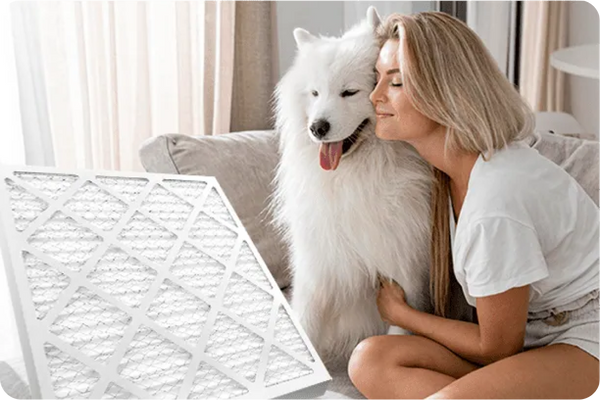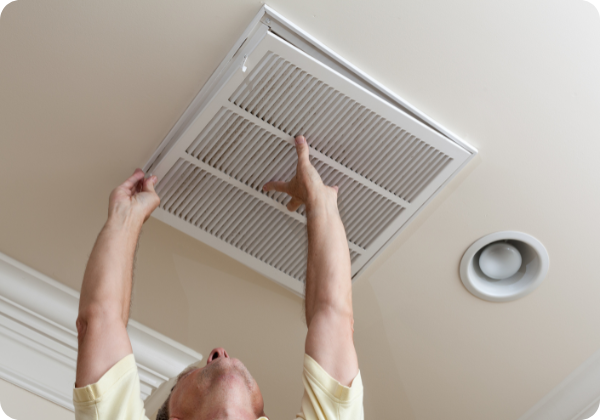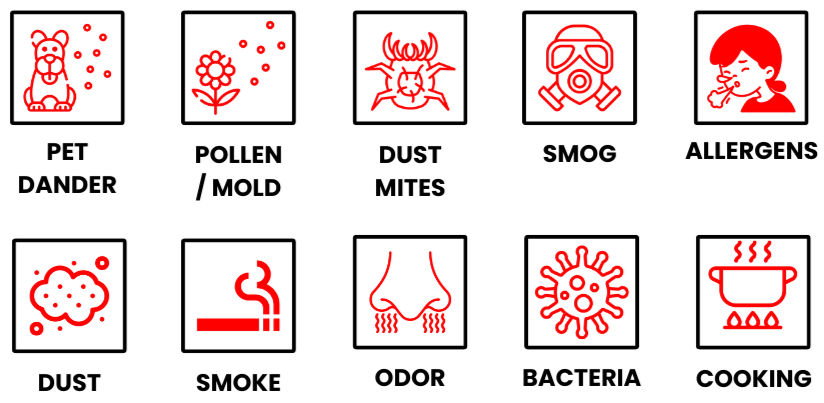-


Verified Reviews
-


Verified Reviews
-


Verified Reviews
-


Verified Reviews
-


Verified Reviews
SHOP FILTERS BY SIZE
Shop By MERV Quality
Residential, Commercial And Industrial HVAC Air Filters

Commercial & Industrial HVAC Air Filters
Keep large spaces cleaner and your HVAC system running smoothly with Custom Filters Direct. Our high-performance air filters are built for factories, warehouses, and office buildings, capturing dust, pollen, and harmful particles to improve air quality. Designed for energy efficiency, our filters reduce strain on your system, lowering energy costs and extending its lifespan. With a wide selection of sizes and MERV ratings, you’ll find the perfect filter for your needs. Plus, our long-lasting filters minimize replacements, saving you time and money.
Shop Now Learn More
Residential HVAC Air Filters
Breathe cleaner, healthier air at home with Custom Filters Direct. Our residential HVAC filters trap dust, pollen, pet hair, and allergens to reduce asthma and allergy triggers while improving indoor air quality. Available in multiple MERV ratings, they keep your HVAC system efficient and lasting longer by preventing dirt buildup. Regular filter changes enhance airflow, comfort, and system performance. Enjoy fast delivery and simple online ordering for a fresher, healthier home.
Shop Now Learn More
Custom Size Air Filters
Get the perfect fit for your HVAC system with custom-sized air filters from Custom Filters Direct. Ideal for unique vents, older units, or special requirements, our filters are made to your exact specifications. We offer over 1,000 standard sizes, with custom options available for tricky spaces. Need help? Use our sizing resources or contact our team for expert guidance. Our high-quality, affordable filters improve air quality and HVAC performance. While custom orders take a little longer, we have standard sizes ready to ship fast. Trust us for filters that fit right, perform well, and keep your air cleaner.
Shop Now Learn MoreIndustries We Serve
At Custom Filters Direct, we provide high-quality air filters tailored to meet the unique needs of various industries. Our commitment to innovation, efficiency, and air quality makes us a trusted partner for businesses across multiple sectors. Discover the industries we proudly serve:

HVAC and Building Maintenance

Manufacturing and Industrial Facilities

Healthcare and Pharmaceutical

Food Processing and Packaging

Proof Of Happy And Satisfied Customers
There’s no better proof of the quality of our air filters and service from our satisfied customers:

I use this website every time I need to order filters for my house. Service is great, & the product is great. We had a very hard time finding our odd sized filter in stores or online.



I own and operate a residential rental property business. Changing air filters has been a huge challenge for us in the past. Custom Filters Direct made the entire process for us a breeze



I never knew the importance of an air filter subscription until I actually had my filters delivered on a quarterly basis. Every time I forgot about the filters they show up in the mail!



We needed a custom size for our new rooftop units, contacted Custom Filters Direct and they got me exactly what I needed, delivered to my property managers office a few days later. Highly recommended



I emailed them a list of my furnace filter sizes. The quote I got was spot on, and it arrived on time. I am going to reorder from them



They arrived quickly and I noticed the difference in air quality the night I put them in! Perfect filters – especially for anyone with allergies!


-


(46) Verified Reviews
-


(46) Verified Reviews
-


(46) Verified Reviews
-


(46) Verified Reviews
-


(46) Verified Reviews
Why Choose US?
Frequently Asked Questions
- Step 1 - To determine the correct size for your filter, start by removing it from its vent.
- Step 2 - Check the side of the filter to see if the size is printed, such as 20x20x1. If the size isn’t printed, use a ruler or tape measure to measure its dimensions.
- Step 3 - Measure the length (the longest side), width (the shorter side), and thickness (how thick the filter is). Round each measurement to the nearest inch.
Following these steps will help you find the right size to replace your filter or order a custom one.
The three main types of air filters are:
- Fiberglass Filters: These are basic, budget-friendly filters that trap larger particles like dust and lint. They provide minimal filtration and are suitable for general use in low-demand environments.
- Pleated Filters: Made of polyester or cotton paper, these filters have a pleated design that increases their surface area, allowing for better filtration. They are more effective at capturing smaller particles such as dust, pollen, and mold spores.
- HEPA Filters: High-Efficiency Particulate Air (HEPA) filters are highly efficient, capturing up to 99.97% of airborne particles as small as 0.3 microns. They are ideal for improving air quality in environments where allergens, dust, and other small pollutants are a concern.
Each type of filter offers different levels of efficiency, so it's important to select the one that best meets your air quality needs.
Yes, some air filters are reusable, while others are not. Washable or reusable filters can be cleaned and used again after they become dirty. These are typically made from materials like aluminium or fibreglass. However, disposable filters are designed to be replaced once they are clogged and cannot be reused. Always check the manufacturer's guidelines to determine if your filter is reusable or needs to be replaced.
Air filters don’t actually detect air quality on their own. However, some air systems have sensors that can detect things like dust, smoke, or harmful gases in the air. When these sensors notice poor air quality, they can adjust the system to clean the air more effectively.
Air filters help improve air quality by trapping things like dust, pollen, and allergens. Filters like HEPA or carbon filters are made to catch these particles, making the air cleaner and healthier to breathe.
Custom air filters are a better choice than standard filters for a few reasons:
- Perfect Fit: They are made to fit your specific system, which helps it work better.
- Better Filtration: You can choose the type of filter you need, whether it’s for dust, allergens, or other particles.
- More Efficient: Custom filters can match your system’s airflow, making sure it works smoothly and doesn't clog up.
- Last Longer: Since they are made for your system, custom filters can last longer and save you money on replacements.
- Made for Your Needs: Custom filters can be designed for special environments, like areas with a lot of pollution or clean rooms.
Overall, custom air filters give you better protection and performance, making them a smart choice for your needs.
It is generally not recommended to cut air filters to size. Cutting a filter can damage it, reduce its effectiveness, and affect its ability to properly filter the air. Most air filters are designed to fit specific sizes, and altering them could lead to gaps where air can bypass the filter, allowing dust and allergens to escape.
If your filter doesn't fit, it's best to buy one that is the correct size or use a custom filter designed to meet your needs. Always follow the manufacturer's guidelines for the best performance.
Changing your air filter is a simple process. Here's a step-by-step guide:
- Turn off the system: Before you begin, turn off the heating or cooling system to prevent any air from blowing while you change the filter.
- Locate the air filter: Find the filter in your system. It is usually located in the return air duct, air handler, or HVAC unit. It may be behind a panel or grill.
- Remove the old filter: Carefully slide out the old filter. Take note of how it’s positioned (the direction of the airflow is usually indicated on the filter frame).
- Check the size: Before installing a new filter, make sure the replacement filter is the same size as the old one. This is important for proper fit and performance.
- Insert the new filter: Slide the new filter into place, ensuring it is positioned in the same direction as the old one (airflow arrows usually point toward the unit).
- Turn the system back on: Once the new filter is in place, close the panel and turn your system back on.
Check your filter regularly and replace it as needed, usually every 1-3 months, depending on the type of filter and your usage.
You should replace your air filter every 1 to 3 months for most standard filters. If you have pets, allergies, or live in a dusty area, you might need to replace it more often.
For high-efficiency filters like HEPA, you can usually replace them every 6 to 12 months.
It's a good idea to check your filter every month. If it looks dirty or clogged, replace it, even if it's not quite time yet. Replacing the filter regularly helps keep the air clean and your system working well.
MERV, MPR, and FPR are ratings that show how well an air filter traps particles:
- MERV (Minimum Efficiency Reporting Value): Rates filters from 1 to 20. Higher numbers mean the filter traps smaller particles, like dust and allergens.
- MPR (Micro-Particle Performance Rating): This is used for 3M filters and measures how well they capture tiny particles. Higher numbers mean better filtration.
- FPR (Filter Performance Rating): This rating is used for filters sold at Home Depot, ranging from 4 to 10. Higher numbers indicate better filtration.
The main difference is the scale they use, but all help you understand how good a filter is at cleaning the air. The higher the number, the better the filter.
Using the wrong size air filter can cause problems like:
- Poor Air Quality: If the filter is too small, air can bypass it, letting dust and allergens get into your system.
- Reduced Efficiency: A filter that’s too big may not fit properly, blocking airflow and making the system less effective.
- Damage to the System: A bad fit can strain your system, making it work harder and potentially causing damage.
Always use the correct size filter for the best performance and air quality.
If you have any questions or concerns about our service or products, reach out to us using this contact information:
Contact No: (877) 556-2862
Email ID: info@customfiltersdirect.com

 Email Us
Email Us 500k+ Businesses & Facilities
500k+ Businesses & Facilities
 Get a Quote
Get a Quote 1-877-958-5612
1-877-958-5612 Free Shipping orders over $25.00
Free Shipping orders over $25.00 Money Back Guarantee
Money Back Guarantee

















 Akshay Sadiora
Akshay Sadiora





